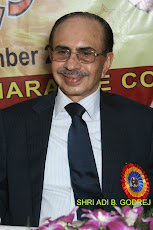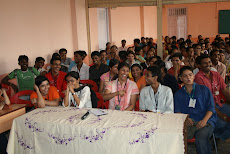What is wrong with the teaching of Economics?
“An idea whose time has come again: Maybe it will take a little longer than 2040 to fulfil Goldman Sach’s prediction that the world’s ten biggest economies, using market exchange rates, will include Brazil, Russia, Mexico, India and China. But these are arguments about when, not whether, change will happen. And things could speed up…This shift is not as extraordinary as it first seems. A historical perspective shows it to be the restoration of the old order. After all, China and India were the world’s biggest economies until the mid-19th century, when technology and a spirit of freedom enabled the West to leap ahead…. There are weaknesses in some growth stories. China’s population is ageing and India’s schools are rotten….”- The Economist, September 16, 2006.
“A few years ago, I predicted that the time would come when a person’s wages and standard of living would no longer be determined by the country they live in, but instead would be a result of the education they have had. Today we start to see this vision becoming a reality in India. The challenge is to extend progress and opportunity to every section of society and every corner of the nation. If government, business and non-profits continue to work together to bridge the digital divide and enable India to realise its potential to become a creator of intellectual capital. I believe you will truly become a nation where everyone has the opportunity to achieve their potential.” – Bill Gates, Outlook, 21 August 2006.
Both the above quotes show that India definitely has potential to make it to the top, but this depends largely on the quality of education.
The 8% growth-rate has become a way of life for Indians… Reforms have pulled millions out of poverty and misery… If we can achieve a 10% growth-rate in the near future, most of the poverty will vanish… How do we plug in the leakage of 2%??? It’s the crumbling infrastructure and the rotten education system, stupid…
We need to start somewhere… the first step would be to throw away the age-old books. If mid-day meals can do the wonder in rural areas, good books too can do the trick in our schools and colleges! This will surely attract students to read more and to enjoy what they are reading.
Look at our economics textbooks, there is no humour, no pictures, no colour… all you can find is tons and tons of boring statistics and meaningless sentences… How do you expect students to even read them, leave apart learn from them… Well, if anything they can surely work as a remedy for insomnia!!!
Besides they do nothing to satisfy the increased curiosity towards economics throughout the country. A curiosity aroused by the second fastest growing economy in the world suddenly having to face rising inflation and a global slowdown. The Indian economy has been growing at very impressive rates of 7 – 8 % in the last 4 – 5 years. However suddenly it looks like the rising prices would spoil the party. Many people want to read, understand and learn economics. In the classroom too it is always treated as a dry subject dealing with abstract theories. Once we change our old textbooks and the teachers get used to new tools of learning such as Internet and Multimedia, economics can become very interesting.
Now, just take a look at some good books from around the world. Can’t we too use them for learning the subject?
For Beginners…
Microeconomics by Michael Parkin – Addison-Wesley www.econ100.com
Economics – A Complete Course by Dan Moynihan and Brian Titley – Oxford Edition
Undergraduate Level…
(Indian editions are available for all the books given below)
Principles of Economics by N. Gregory Mankiw – Thomson South-Western
Principles of Economics by Robert Frank & Ben Bernanke – McGraw Hill
Economics by Lipsey and Crystal – Oxford Edition
Also the books Microeconomics and Macroeconomics by the same authors (McGraw Hill)
Principles of economics Karl E. Case and Ray C. Fair – Prentice Hall
Moving ahead let us look us some books on economics for general reading…
Freakonomics: A Rogue Economist Explores the Hidden Side of Everything by Steven Levitt and Stephen Dubner
(This book has being used as a text-book at leading universities like Berkeley and Purdue!!!)
Undercover Economist by Tim Harford
The World is Flat: A brief history of the Twenty-First Century by Thomas Friedman
Happy Reading !!!
My Blog List
-
Aug 16th chat on “Trade, Tariffs and International Trade”
-
I am excited to announce that this Saturday, 16th August, Akshar
Prabhudesai is hosting a zoom event on Indicforum.org with yours truly as
the guest. We wi...
4 days ago
-
-
How to Believe in Free Speech
-
(June 12, 2018 02:56 PM, by Bryan Caplan) Almost all libertarians earnestly
say, "I believe in free speech." Normally, though, this goes way beyond
the ri...
7 years ago
-
To the Streets: Occupy Wall Street moves to Main Streets
-
The "Occupy Wall Street" movement is moving to Main Streets across the
globe. It's about time. But I fear that the movement will be captured by
the far lef...
13 years ago
-
-
-
Our Dollar, Your Problem
-
I just finished *Our Dollar, Your Problem* by my Harvard colleague Ken
Rogoff. It is a great read for econonerds like me, especially for those who
lean ...
6 days ago
-
गरीबी हटाओ की नहीं, अमीरी लाओ की जरूरत
-
दैनिक भास्कर | 25 जुलाई 2019
कुछ दिनों पहले रविवार की रात एक टीवी शो
में एंकर ने प्रधानमंत्री नरेन्द्र मोदी के 5
लाख करोड़ डॉलर के जीडीपी के लक्ष्य का तिरस्...
6 years ago
-
-
The Innovation Economy T-Shirt
-
If you're reading this, you are likely a member of the Innovation Economy
here in New England: someone who *makes things happen.*
So this t-shirt is for y...
15 years ago
-
The Imitation Game: Defending against AI's Dark Side!
-
A few weeks ago, I started receiving a stream of message about an
Instagram post that I was allegedly starring in, where after offering my
views on Pal...
1 week ago
-
ca va?
-
Many years ago before the World War II, a blitzkrieg of German soldiers
would come right up to the border in their Panzer tanks and turn their guns
at a po...
13 years ago
-
-
-
China Skepticism
-
(I wrote this after my visit to Shanghai and Beijing in May ’10, as part of
my MBA program at Duke. I originally circulated it around with friends and
othe...
13 years ago
-
New Site @ www.tvhe.co.nz
-
Dear avid TVHE readers, We’ve finally set up our own hosting and have a new
site at www.tvhe.co.nz, if you could be so kind as to set your
links/bookmarks...
16 years ago
-
Cautionary Tales – “Genius Still Unrecognised”; The Worst Poet in the World
-
William McGonagall’s poems are something else. The jarring meter, the banal
imagery, the awkward rhymes: they made him a laughing stock in 19th Century
Sco...
3 days ago
-
Inside Money In SERE
-
Like I wrote in the last post, I don't normally post on this blog at all.
But I have a story from the spouse of an undergraduate student that I'd
like to b...
9 years ago
-
My Fav books
- The world is Flat by Thomas Friedman
- Principles of Economics by Ben Bernanke
- Micro Economics by Michael Parkin
- Principles of Economics by Mankiw
- Arthur Hailey-Money Changers, Hotel, Wheels, Final Diagnosis
- Barack Obama , The New face of American Politics
- Undercover Economist - Tim Harford
- Freakonomics






No comments:
Post a Comment